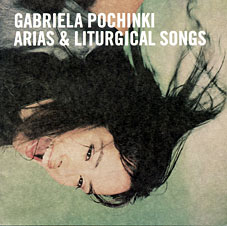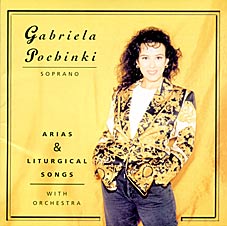
 |
Newest Recording
Gabriela Pochinki “Il dolce suono” The Sweet Sound
Arias and Liturgical Songs
Performed with Radio Orchestra Symphony of Krakow
Conductors: Andrzej Straszynski and Peter Sulkovski
1. Allelujah • Exsultate, jubilate (W.A. Mozart) 2:41
2. Deh, vieni, non tardar (Susanna) • Le Nozze de Figaro (W.A. Mozart) 4:05
3. In uomini, in soldati (Despina) • Così Fan Tutte (W.A. Mozart) 2:25
4. Regnava nel silenzio (Lucia) • Lucia di Lammermoor (G. Donizetti) 6:51
5. Il dolce suono mi colpì di sua voce (Lucia) • Lucia di Lammermoor
(G. Donizetti) 15:45
6. So anch’io la virtù magica (Norina) • Don Pasquale (G. Donizetti) 5:42
7. Kommt ein schlanker Bursch gegangen (Änchien) • Der Freischütz (C.M. von
Weber) 3:38
8. O mio babbino caro (Lauretta) • Gianni Schicchi (G. Puccini) 2:05
9. Je veux vivre (Juliette) • Romeo et Juliette (C. Gounod) 3:42
10. Somewhere (Maria) • West Side Story (L. Bernstein) 3:03
11. Grossmächtige Prinzessin, wer vestünde nicht (Zerbinetta) • Ariadne auf
Naxos
(R. Strauss) 8:40
12. Ave Maria (Latin) • (C. Gounod) 5:22
13. Ave Maria (Italian) • (F. Schubert) 5:08
14. Eili Eili, lomo Azavtoni (Aramaic) • (Anonymous) 3:17
Total Time: 72:45
P©2001 EZ Production. Reservados todos los derechos del productor, de los
autores y de los intérpretes
de las obras reproducidas en este ejemplar. Prohibida la reproducción,
regrabación, alquiler, préstamo, canje, ejecución pública, radiodifusión y
cualquier otro uso no autorizado de estos fonogramas.
SADAIC - BIEM - AADI - CAPIF
All rights reserved. Unauthorized duplication is a violation of applicable
laws. Printed in U.S.A.
THE SINGING BEAUTY
In an earlier CD, Gabriela Pochinki sings "I feel pretty." She feels what she is.
She is also a lovely singer who happens to be a sensitive actress, a package that not many opera singers can offer, even nowadays, when good looks and high performing standards are less of a rarity than yesteryear, when vocal endowment more often than not didn't go hand in hand with appearance and, even less, acting ability.
Gabriela also belongs to the bevy of young singers from spanish-speaking countries (many of them from Argentina) who have started to shine on the world's most important operatic stages. She was the first to star in the U.S. in an utterly American musical, West Side Story no less, a work in which visual crediblity is as important as vocal accomplishment. To those endowments this singer adds fluency in several languages (Italian, German, Spanish, Hebrew, English and French) an almost indispensable requirement for an opera singer. Besides her inborn, exquisite musicianship, she has had a solid musical education (she graduated with a masters from the Manhattan School of Music) and she even earned a Bachelor of Science degree in vocal therapy in the prestigious Salvador University in Buenos Aires. With such training, it's no surprise that she earns rave reviews wherever she performs, be it Europe, North and South America, or the Middle East; whether in opera, operetta or in concert.
Her newest CD again offers ample proof of Gabriela Pochinki's versatilty. Many musicians wrote prayers to the Virgin Mary, such as Charles Gounod, the composer of Faust. He arranged a Bach Prelude and turned it into a soaring, impassioned Ave Maria. But the most famous of all musical prayers is Franz Schubert's Ave Maria, which is a part of a three lieder set, Ellen's Songs. It's followed by another, less known and anonymous but equally moving invocation, sung in Aramean, Eili, Eili. With the strains of Alleluia, Wolfgang Mozart joyously praises the Lord in an aria that bristles with coloratura.
Then it's back to Mozart, with the enchanting Deh, vieni, non tardar (Come, do not tarry), from Figaro's Wedding. Susanna waits in the moonlit garden for her beloved Figaro's arrival. Still more Mozart: but from Così Fan Tutte (That's How They All Do It). The pert young maid Despina laughingly asks her mistresseses if they really believe that men, especially soldiers, can be faithful lovers.
The mood changes in Lucia de Lammermoor, Gaetano Donizetti's most famous opera, based on a novel by the british Romantic novelist Sir Walter Scott. In Regnava nel silenzio (Silence reigned) Lucia, who is waiting for her lover in the woods, near a fountain, tells her companion Alisa the sad story of a woman who drowned there and how her ghost appeared to her. In Il dolce suono mi colpì di sua voce (I heard the sweet sound of his voice) Lucia remembers her beloved in the famous Mad Scene. The poor girl had been forced to marry against her will, gone mad and murdered the bridegroom. Now we turn to Donizetti's delightful comedy, Don Pasquale. Norina is reading a medieval novel about knights and their ladies. In a spanking aria she states that she also knows the magic virtue (So anch'io la vertù magica) to make men fall in love with her.
Carl Maria von Weber was Germany's most important Romantic opera composer. From Der Freischütz (The Cursed Hunter), his masterpiece, is the charming little aria (Kommt ein schlanke Bursch gegangen/When a slim young man comes along) by which Änchen tries to cheer up her melancholy cousin Agathe by telling her a funny story. Giacomo Puccini composed only one comic opera, Gianni Schicchi. In O mio babbino caro (Oh, my beloved Daddy) Lauretta, Schicchi's daughter, pleads with her father to devise some clever scheme to aid her lover's family, which he had flatly refused. If he doesn't, she will jump into the Arno from the Ponte Vecchio (the opera takes place in Florence). Shakespeare's Romeo and Juliet has attracted several composers. Gounod, who wrote the homonymous opera, was one of them. In the first act Juliet sings of her happiness, hoping that love will come soon (Je veux vivre/I want to live that dream).
Somewhere, from Leonard Bernstein's West Side Story, is a deeply felt song of yearning for a time and place where hatred and discrimination will no longer exist. Zerbinetta, a vivacious commedia dell' arte character, also tries to cheer up the moping Ariadne, who has been abandoned on an island by her lover. This tremendously difficult scene, Grossmächtige Prinzessin (Most powerful Princess) belongs to one of Richard Strauss' best loved operas, Ariadne auf Naxos (Ariadne in Naxos).
Alfredo Cernadas
The Buenos Aires Herald
IL DOLCE SUONO (El Dulce Fonido)
En su primer recital, Gabriela Pochinki canta "I feel pretty", "Me siento bonita." Siente lo que es. También es una adorable cantante además de actriz sensible, conjunción que no se da en todas las cantantes líricas, aún actualmente, en que el aspecto atractivo y alto nivel interpretativo son menos raros que en el pasado, cuando las dotes vocales no se veían a menudo acompañadas por un físico agraciado y, mucho menos, talento actoral.
Gabriela pertenece a la camada de cantantes hispano parlantes jóvenes (entre las que hay varios/as argentinos/as) que han empezado a brillar en los teatros líricos más importantes. Fue la primera argentina en protagonizar un musical netamente norteamericano en los Estados Unidos. Protagonizó nada menos que el rol de "Maria" en Amor sin Barreras, obra en que la credibilidad visual es tan importante como el rendimiento vocal. A esas dotes se agrega el dominio de varios idiomas (italiano, alemán, francés, inglés, español, hebreo), un requisito casi indispensable para una cantante lírica. Además de su exquisita musicalidad innata cuenta con una sólida preparación académica (se graduó en la Manhattan School of Music) y se recibió de fonoaudióloga en la prestigiosa Universidad del Salvador, facultad de Medicina, en Buenos Aires. Con tal bagaje, no sorprende que recoja elogios superlativos dondequiera que se presente, ya sea en Europa, América del norte y del Sur, en ópera, opereta o concierto.
Su nuevo recital grabado vuelve a ofrecer pruebas contundentes de su versatilidad. Comienza la más famosa de las plegarias musicales, Ave María, de Gounod, el compositor de "Fausto", que arregló un Preludio de Bach. Le sigue la más famosa de las invocaciones a la Vírgen: Ave María, que Schubert incluyó en una serie de tres Lieder, las Canciones de Ellen (Ellen's Gesänge). Le sigue otra oración, anónima pero no menos conmovedora, Eili, Eili, cantada en arameo. Con los sonidos exultantes del Aleluia, de Wolfgang Mozart, él alaba gozosamente al Señor, en un aria salpicada de coloratura.
También de Mozart, es la arrobadora Deh, vieni, non tardar (Ven, no tardes), de Las Bodas De Fígaro. En ella Susana espera la llegada de su amado en el jardín bañado por la luz de la luna. Más Mozart, pero de Così Fan Tutte (Así hacen todas). La pizpireta camarera Despina les pregunta a sus amas si se puede esperar fidelidad de los hombres, especialmente los soldados (In uomini, in soldati).
En el primer acto de Lucia di Lammermoor, la obra más célebre de Gaetano Donizetti, la protagonista Lucia espera a su amado cerca de una fuente. Le relata a su acompañante Alisa la historia de una antepasada que se ahogó ahí. En la famosa escena de la locura la joven, que ha perdido la razón al ser forzada a casarse con un hombre que no ama (al que asesinó), se presenta en el banquete de bodas y, en su delirio, recuerda la dulce voz de su amado (Il doce suono mi colpì di sua voce). En cambio, Don Pasquale, también de Donizetti, es una encantadora comedia. Norina lee una novela sobre los amores de damas y caballeros medievales. Afirma que ella también conoce la virtud mágica para enamorar a quien desee. (So anch'io la virtù magica/Yo también conozco la virtud mágica).
Carl Maria von Weber fue el más importante compositor romántico de ópera de Alemania. De su obra maestra, Der Freischütz (El Cazador Maldito), tenemos su encantadora arietta (Kommt ein schlanker Bursch gegangen/Vino un joven flaco), en que la vivaz Anita trata de levantarle el ánimo a su prima Agata, que está deprimida. Giacomo Puccini compuso una sola, pero genial, ópera cómica, Gianni Schicchi. Este se niega a ayudar a la familia del amado Lauretta, su hija. Esta entonces le dice que, si no lo hace, se arrojará al Arno desde el Puente Viejo (la acción transcurre en Florencia) (O mio babbino caro/O mi querido papito).
Romeo y Julieta, de Shakespeare, es una tragedia que interesó a varios músicos. Uno de ellos fue Gounod, quien compuso la ópera homónima. En el primer acto la protagonista se presenta cantando su felicidad, esperando que llegue el amor, con Je veux vivre (Quiero vivir ese sueño). Somewhere (En alguna parte), de West Side Story, es una canción conmovedora que expresa un anhelo profundo por un lugar y una época en que el odio y la discriminación no existan más. Zerbinetta es un vivaz personaje de la commedia dell' arte, que intenta animar a Ariadna, la princesa que ha sido abandonada por su amado en una isla desierta. Esta dificilísima escena (Grossmächtige Prinzessin/Poderosa Princesa) pertenece a una de las obras más apreciadas de Ricardo Strauss, Ariadna en Naxos.
Alfredo Cernadas
The Buenos Aires Herald
|
|





